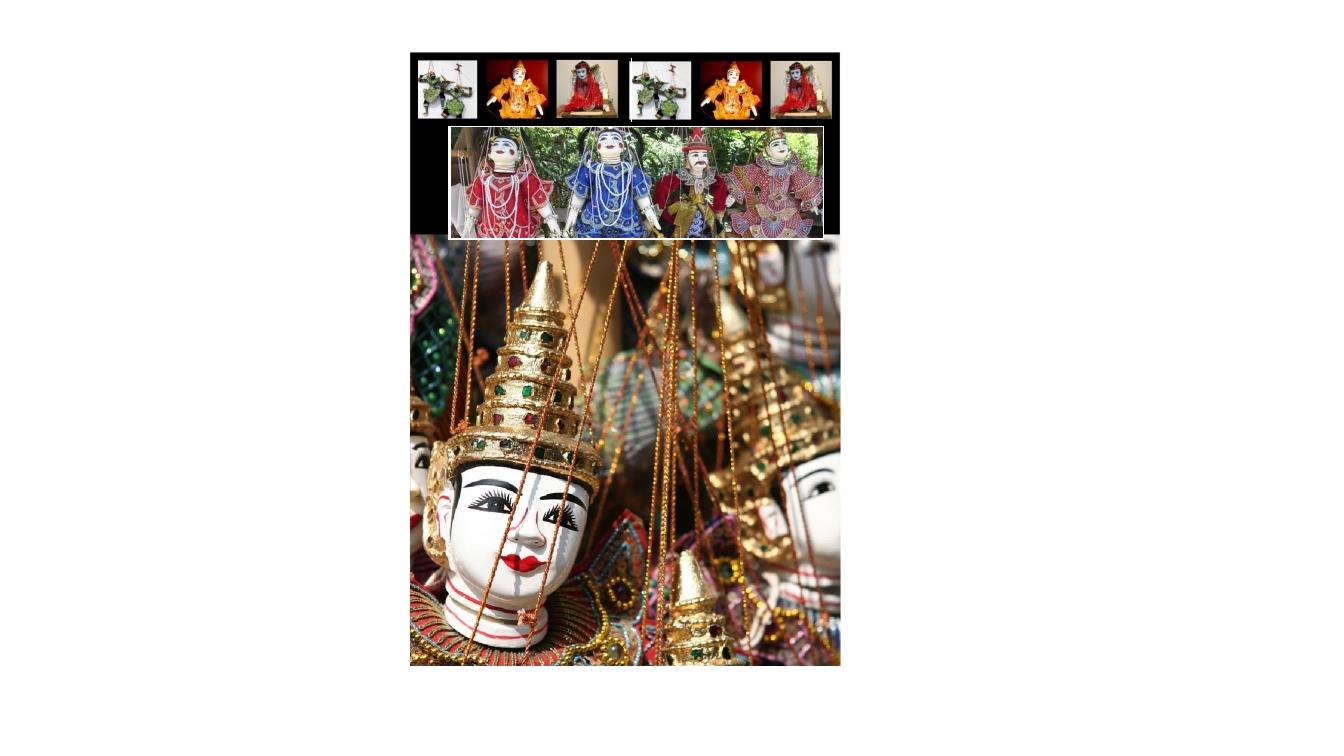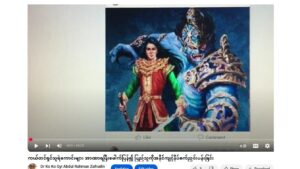By Maha Bandula a pseudonym of Dr Ko Ko Gyi in Burma Digest | Adapted and Edited for MMNN
Once upon a time, in a land called Shwe Bama Paradise, there lived an old puppet maker named Ah Ba Aung. Wise and kind, he was deeply respected for his craftsmanship and understanding of life. His only son, Mg Tat, was intelligent but arrogant — a young man who believed he knew everything.
One day, Mg Tat decided to travel abroad in search of wealth and glory. Before his departure, Ah Ba Aung handed him four of his most treasured puppets:
- A Nat – a guardian spirit,
- A Be Loo – a fearsome ogre,
- A Zaw Gyi – a mystical alchemist,
- And a Holy Monk – a symbol of goodness and moral virtue.
“Use them wisely,” his father warned. “Each serves a purpose, but only when guided by wisdom and compassion.”
The Journey Begins
On the first night of his journey, alone and anxious, Mg Tat mockingly asked the Nat puppet if it was safe to sleep under a tree. To his astonishment, the Nat came to life and advised him to inspect the surroundings. Upon doing so, Mg Tat noticed fresh tiger tracks and quickly climbed the tree. Later that night, the tiger returned. The Nat had saved his life.
The next day, Mg Tat saw a long caravan and greedily asked the Be Loo how he could get rich quickly. The ogre came to life and taught him a cruel lesson: “Might is right.” Mg Tat, with Be Loo’s help, robbed the entire caravan.
Among the spoils was a young woman — a princess, traveling with her father, the deposed King Lu Du. Mg Tat fell in love with her, but she resisted. Still intoxicated by power, Mg Tat abducted her.
Confused about what to do next, he turned to the Zaw Gyi, who showed him secrets of the earth — maps of mineral riches, fertile lands, and shortcuts to wealth. Mg Tat soon became fabulously rich. But despite his affluence, the princess remained distant, her heart locked away from her captor.
One day, she escaped.
Turning Point
Neither the Be Loo nor the Zaw Gyi could help. Only then did Mg Tat remember the two puppets he had neglected: the Nat, who had once saved his life, and the Holy Monk, whom he had never consulted.
These two finally spoke. They reminded him:
“Power and wealth alone do not bring happiness. Physical possession cannot earn love. True joy comes from a pure heart and good deeds.”
Mg Tat, ashamed and repentant, returned to a life of kindness and generosity. Through his good works, he encountered the princess and her father once again. He apologized sincerely, returned their possessions, and begged forgiveness.
Recognizing Mg Tat’s transformation, King Lu Du appointed him as a trusted advisor. Eventually, even the princess grew to admire him. Their marriage was legal and consensual. Mg Tat became Ein Shei Min — the Regent — and later ascended as king of Shwe Bama.
They ruled justly and happily ever after.
Zat Paung Khan (Epilogue): A Tale Within a Tale
- Shwe Bama Paradise is our beloved Union of Burma.
- Ah Ba Aung, the wise puppet master, represents General Aung San, father of the nation.
- His son, Mg Tat, symbolizes the Tatmadaw (Myanmar Military).
- The Nat is the spirit of Maha Bandula, loyal to General Aung San, who only intervenes when absolutely necessary.
- The Be Loo (Ogre) represents Generals Ne Win, Saw Maung, and Than Shwe, who taught the doctrine of force.
- The Zaw Gyi represents foreign powers: North Korea, Pakistan & Russia (nuclear knowledge); China, India, Thailand and Singapore (economic and military aid).
- The tiger stands for foreign colonialists — especially Imperial Japan.
- The princess symbolizes Daw Aung San Suu Kyi, beloved by the people.
- The caravan robbery is a metaphor for the military coup.
- King Lu Du stands for the People.
- The Holy Monk represents monastic leaders like Sayadaw U Gambira who led peaceful resistance.
Lessons from the Tale
- Might is not always right.
- Wealth cannot buy love.
- Power and riches cannot bring lasting happiness.
- Wisdom and virtue must guide strength and knowledge.
- What you have is less important than how you use it.
- True happiness comes from compassion, not control.
- Violence breeds hatred; kindness breeds loyalty.
- Love and respect are earned through humility, not fear.
Reflections and Warnings
To Mg Tat / Myanmar Tatmadaw:
Open your eyes. Remember the teachings of your founding father, General Aung San. Do not blindly follow the cruel commands of ogres like Than Shwe. Earn back the love of your people through good deeds, not intimidation.
To the Ogres / Coup Generals:
Your selfish actions have disgraced the Tatmadaw and alienated it from the people. Repent. Return the power stolen from the people and the National League for Democracy (NLD). A path to redemption still exists. One day, your soldiers may win back trust — if you pursue peace and justice like your ASEAN neighbors.
To the Zaw Gyis / Foreign Supporters:
Stop arming and funding tyranny. Do not trade principles for profit. Stand with the people.
To the People of Burma (Lu Du):
Be brave. Be patient. Continue the Spring Revolution with courage. Remember the words of General Aung San:
“Search and strike the nearest enemy.”
In today’s world, that may mean confronting injustice wherever it appears — even if it’s in uniform.
“What one possesses is not important; how one uses it, is everything.”
Let us hope Myanmar writes its own happy ending — not through might, but through wisdom, compassion, and unity.






